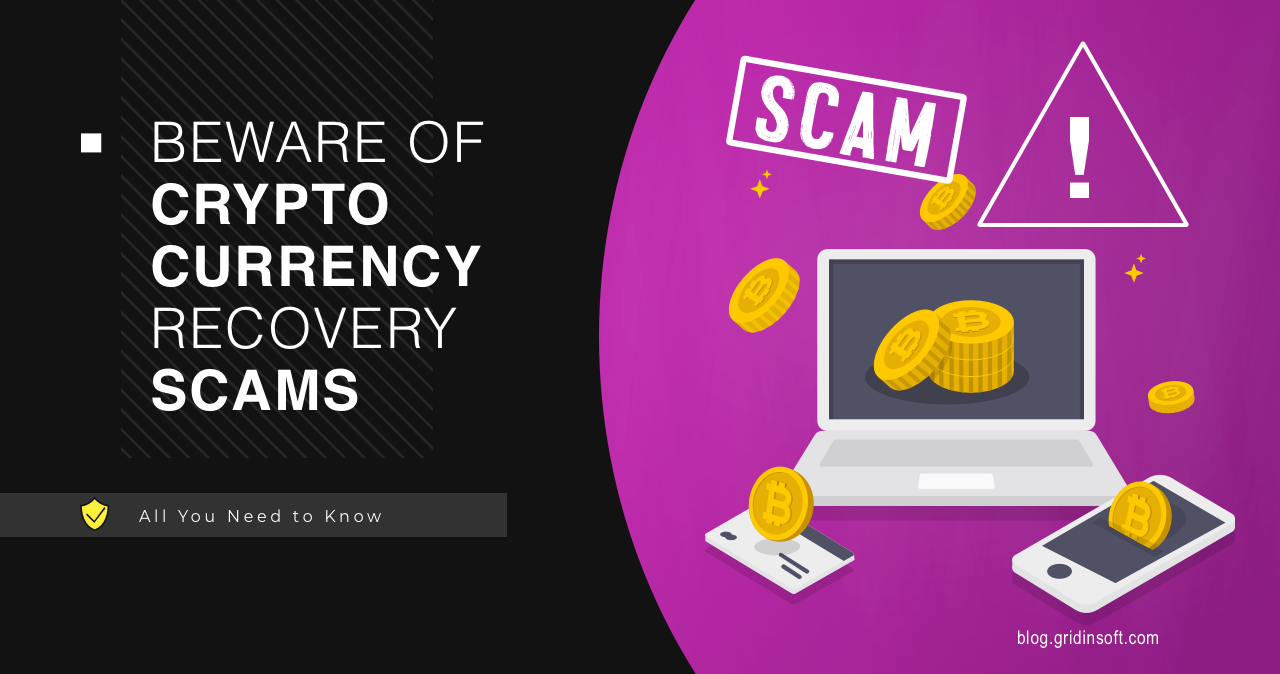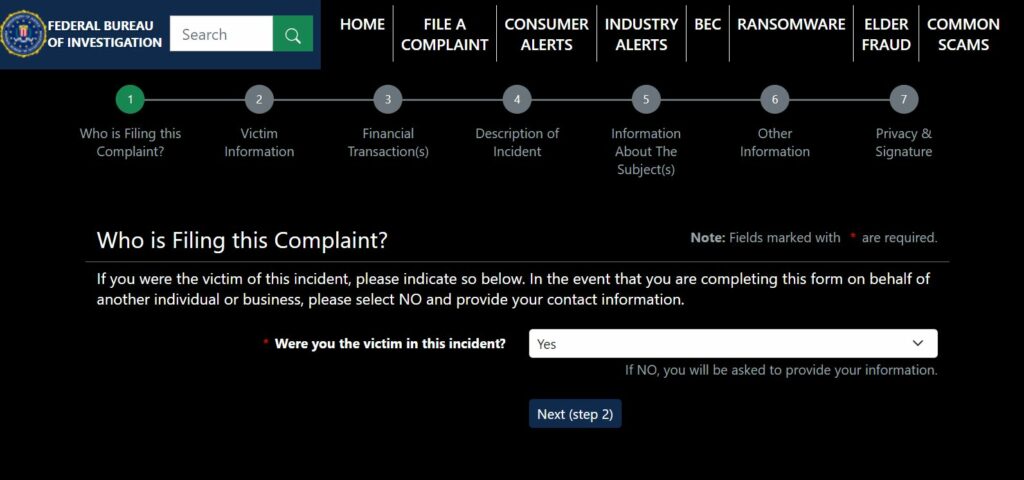Crypto recovery scams are a specific type of fraudulent activity that piggybacks on victims of cryptocurrency scams. Con actors offer their help in restoring the lost money on the Internet, claiming to be professional recovery agents. What they do is defraud people once again, charging sums comparable to the amount of the initial loss.
Crypto Recovery Scam Explained
The hype around cryptocurrencies has slowed down recently, but the number of scams related to this topic has never come down. Moreover, another vector has emerged – crypto recovery scam, which targets people who have already become victims of crypto fraud.
Getting into a financial fraud related to an investment can hit the wallet pretty hard, so the urge to get the money back has obvious motivation. In certain cases, it is technically possible to recover lost assets, and some legitimate organizations can assist victims in doing so. Still, it is very individual and depends on many factors, and there is never a guarantee of success.
The loss of cryptocurrency can occur for a variety of reasons, including technical failures (dead hardware wallet key) or human factors. But what the fraudsters concentrate their attention on are fraudulent investment schemes rather than technical issues. Incidentally, we have a separate post about cryptocurrency fraud, but this time we will focus on fraudulent “cryptocurrency recovery agencies”. Long story short – attackers could not ignore people who fell victim to one scam and developed a whole scheme to scam them again.
Examples of Recovery Services
| Domain | Description | Registration |
|---|---|---|
| Againstcon.com | A site masquerading as a crypto recovery service, possibly fraudulent. | 2023-02-09 |
| Cleedenz.com | Fraudulent site offering services to recover lost cryptocurrencies. | 2023-10-09 |
| Fiordintel.net | A phishing site pretending to be a service for tracking and recovering cryptocurrencies. | 2024-07-02 |
| Walletblockchain.net | A deceptive site offering fake solutions for recovering cryptocurrencies. | 2024-07-17 |
| Leeultimatehacker.com | A scam site promising to hack accounts to recover lost funds. | 2024-04-05 |
How Do Crypto Recovery Scams Work?
Usually, these scammers are looking for victims on social media, particularly in crypto investment-related groups or trading forums. It all starts with comments from people who allegedly have managed to get their money back. They provide the contact information of a ‘specialist’ and claim to have helped but are actually part of the fraudulent scheme. In another scenario, fraudsters directly contact victims (mostly in crypto communities) and offer their help in restoring their crypto assets. One more scheme involves fraudsters selling lists of victims they have deceived or hacked on the Darknet.

After the victim contacts the scammer, they will immediately ask for as much information as possible. This may seem quite logical, since such an operation requires a full pack of victim’s info. However, the scammer will always ask for things that will barely be needed – SSN, detailed personal information, and so on. In addition to this data, attackers almost always require an upfront fee for their work. Quite often, the frauds simply cut any connections upon the upfront payment, but not always. It is often to see them imitating the progress, and asking for more money after some time. Scammers explain this as “additional funds are needed to solve the problem”. Attackers employ a lot of social engineering tactics, which can result in multiple requests for money before they eventually stop responding to the victim.
Red Flags and Potential Risks
Let’s take a look at the main red flags that you’re dealing with a scam. The first thing that should raise concern is a request to make a prepayment without any guarantees. Sure, scammers will promise guaranteed recovery of your funds, but such a guarantee is impossible. Definite false claim = quite an obvious red flag.
The next red flag is the claim that they have “special access”, a private connection with the FBI or another law enforcement agency. Without a confirmation, this claim costs nothing, and any “informal connections” still give you no guarantee that this FBI friend will be helpful. And, after all, if they’re talking about law enforcement – why won’t you go directly to them? The majority of investigation agencies around the world nowadays have an online fraud department, which will be in handy for this case.

Another sign that you are dealing with fraudsters is a sense of urgency and persistence on their part. In this case, the urgency comes not only from the scammers but also from the victim. Frauds often insist that you should not notify law enforcement about the incident, which is a strange demand from “legit money recovery agents” as they present themselves.
The risks of all this, as you can imagine, are quite high. First of all, there are significant financial losses. Usually, fraudsters demand large sums upfront because they realize that the victim is ready to do anything to get the lost crypto back. Secondly, there is the risk of confidential information leakage. Attackers can request credit card information or login details to an online bank. They may then either use this information to finally empty the victim’s accounts or resell this data on the Darknet.
6 Warning Signs
Most crypto recovery services are scams — especially if they promise to return crypto you no longer own. Look out for these warning signs:
- They ask for an upfront fee. If someone asks for money before helping you, it’s likely a scam. They might ask for a small amount first, then keep asking for more.
- They claim to have “special access” to crypto exchanges. Scammers will say they have secret ways to get your crypto back. This is always a lie.
- They ask for your passphrase or sensitive info. If they want this information, they are trying to steal from you.
- They ask for your bank or crypto wallet details. Scammers may ask for your wallet or bank info to “deposit” the recovered crypto. They just want to steal more money.
- No physical address or located outside the U.S. If there’s no address, or it’s outside the U.S., it could be fake. Many scam companies use fake addresses.
- No phone number or only messaging apps. Legit companies talk by phone. Scammers use apps like Telegram or WhatsApp to hide.
How To Avoid Scams?
If you’ve been a victim of a crypto recovery scam, I have a few recommendations that may help. First, report the platform support through which you were defrauded. Contact the platform’s technical support and report the incident. The next step will be filing a report with law enforcement and gathering as much case evidence as you can. While this still cannot guarantee a refund, it can significantly increase the chances of one. Detailed information will also help men in uniform with finding and detaining the fraudsters.
Also you can report scams to:
- The Federal Trade Commission (FTC)
- The Commodity Futures Trading Commission (CFTC)
- The U.S. Securities and Exchange Commission (SEC)
- The FBI’s Internet Crime Complaint Center (IC3)
If you have found an organization that helps you recover your lost funds, research its procedures, refund methods, and real user reviews on the Internet. The major challenge is that recovering stolen cryptocurrency is extremely difficult to recover. And almost the only way to do this is to collect as much evidence and information as possible, gather the necessary package of documents and submit it to law enforcement agencies. Law enforcement may contact the platform’s representatives. If proven that the stolen crypto belongs to the victim, there is a chance that it will be returned. This is the only legal way to get the lost crypto back.




Becareful how you give someone your cryto wallet address it very dangerous, i was once a victim someone hack into my wallet and access all my money i couldn’t be able to have access
Money or Crypto asset lost to Scammers are Recoverable, i was able to recover 180K worth of bitcoin i lost to an investment scam
Unfortunately, many fell victim to these scam platforms.
I tried to invest my savings into forex broker’s trade during Pandemic and ever since last year December have been trying to withdraw my savings and each time i try to withdraw i’m asked to pay for fees and Tax fees
I lost some cryptocurrency recently and it was very hard to get it back from the scammer